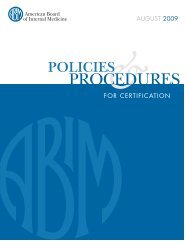The SRA Symposium - College of Medicine
The SRA Symposium - College of Medicine
The SRA Symposium - College of Medicine
Create successful ePaper yourself
Turn your PDF publications into a flip-book with our unique Google optimized e-Paper software.
Papers<br />
ted on patients at l’Hopital St.-Louis in 1859 (Dracobly, 2003).<br />
Louis Pasteur is perhaps more renowned for his discovery <strong>of</strong> the process <strong>of</strong> pasteurization, anaerobic<br />
life, the process <strong>of</strong> fermentation, and development <strong>of</strong> the scientific method. He also discovered<br />
a method to attenuate virulent microorganisms. In 1885, he successfully inoculated a nine-year<br />
old boy named Joseph Meister, who was bitten multiple times by a rabid dog, with rabies vaccine<br />
and in so doing, saved his life. He also developed treatments for chicken cholera and anthrax in<br />
cattle.<br />
Some <strong>of</strong> the above research continues to be controversial, as is the use <strong>of</strong> data collected from them.<br />
Significantly, research that was instrumental in developing successful treatments for a human<br />
disease has received little adverse press.<br />
Human Subjects Protections<br />
Pre-World War II<br />
So far there has been little distinction between medical ethics and research ethics. It is a fine line,<br />
one pr<strong>of</strong>iled in Bernard’s comment about hospitals as the place where physicians (and researchers)<br />
make their observations. As mentioned earlier, medical advances (especially before the early days<br />
<strong>of</strong> the scientific revolution in the late eighteenth century) depended on observations <strong>of</strong> human<br />
diseases and experiments with patients. Evans and Beck note that each generation views life—and<br />
medicine and research—through a different lens. What is commonplace in one century is frequently<br />
decadent, indecent, or immoral in another. It is also worth noting that many experiments<br />
were and remain controversial.<br />
<strong>The</strong> distinction between therapeutic and nontherapeutic research merits distinction. Even though<br />
they used children and slaves, Jenner, Pasteur, and Sims were conducting therapeutic research;<br />
Cleopatra and Hansen were not. In therapeutic research, the patient might realistically benefit<br />
from the experimental intervention. Prior to World War II, nontherapeutic research was not extensive<br />
and there was consequently little concern over the ethical aspects <strong>of</strong> research with humans.<br />
It is important to recognize that social and behavioral research was essentially nonexistent until<br />
the middle years <strong>of</strong> the nineteenth century. Thus human subject research almost always dealt with<br />
treating an injury or a disease.<br />
Although early research with humans was almost invariably clinical in nature, Davies suggests that<br />
Mary Shelley’s Frankenstein is an early research ethics text. He contends that Shelley was familiar<br />
with electricity experiments and wrote the novel for its shock value. In her narrative, however, she<br />
discusses how the scientist can become so thrilled with his work, so caught up by the science, so<br />
excited by success, that he loses his moral perspective. Davies notes that future ethicists have “recognized<br />
that the researcher’s ethical standards are probably the research subject’s most important<br />
protection against harm.”<br />
<strong>The</strong> basic principles <strong>of</strong> the Belmont Report are, according to Aksoy and Tenik, embodied in the<br />
work <strong>of</strong> a thirteenth century Sufi scholar named Mawlana Jalaladdin Rumi (1207-1253). His writings<br />
discuss the ways to a more harmonious life: autonomy, beneficence, non-maleficence, and<br />
justice. Although Mawlana’s attention is not directed at research (or by extension human subjects<br />
<strong>of</strong> medical experimentation), his writings presage the universal concerns <strong>of</strong> modern bioethical<br />
concerns.<br />
<strong>The</strong> earliest “modern” comment specifically about research ethics appears in Wilcock’s 1830 Laws<br />
Relating to the Medical Pr<strong>of</strong>ession: “When an experiment is performed with the consent <strong>of</strong> the<br />
party subjected to it after he has been informed that it is an experiment, the practitioner is answer-<br />
198 2005 <strong>Symposium</strong> Proceedings Book

















